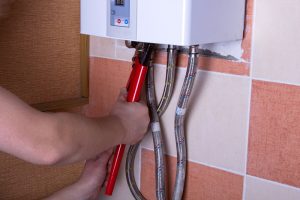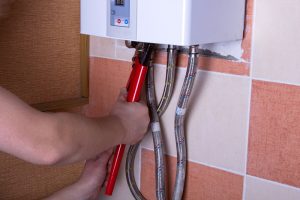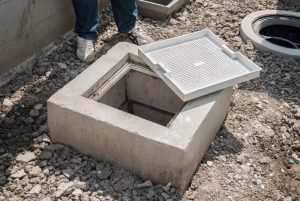 Hard water is one of those things that a lot of residents and business owners deal with, even without realizing. The problem is, it slowly degrades the efficiency of a plumbing system until one day limescale buildup either leads to a clog or pipe leaks. This is a bad enough problem in a home, can you imagine it in your business?
Hard water is one of those things that a lot of residents and business owners deal with, even without realizing. The problem is, it slowly degrades the efficiency of a plumbing system until one day limescale buildup either leads to a clog or pipe leaks. This is a bad enough problem in a home, can you imagine it in your business?
There are a couple of things you can and should do to make sure your business or commercial space is properly protected from hard water, even if you aren’t sure you have it. Keep reading to learn more about this common plumbing problem!

 If there is any home comfort system people take for granted, it’s typically their water heater—even though this is one of the appliances we all rely on the most! When it comes time to replace yours you’ll definitely notice it, but this isn’t a purchase you should rush into.
If there is any home comfort system people take for granted, it’s typically their water heater—even though this is one of the appliances we all rely on the most! When it comes time to replace yours you’ll definitely notice it, but this isn’t a purchase you should rush into. Homeowners often assume they can just get a general handyman to fix any problem they have—you pay less and they do an effective job, right?
Homeowners often assume they can just get a general handyman to fix any problem they have—you pay less and they do an effective job, right? A common service we often recommend to our customers is routine drain cleaning as part of your overall plumbing maintenance. Our plumbers will come to your home and use the best in current technology—such as a hydro-jet system—to thoroughly clear out the drainpipes throughout your household.
A common service we often recommend to our customers is routine drain cleaning as part of your overall plumbing maintenance. Our plumbers will come to your home and use the best in current technology—such as a hydro-jet system—to thoroughly clear out the drainpipes throughout your household. Standard storage-tank water heaters are the type most often found in homes today—it’s the conventional system that people are used to. They’re big, and very noticeable, even if “hidden” away in a closet. Therefore, even if you don’t spend a lot of time thinking about it, you do know that it needs service. After all, scaling from hard water can have a major negative impact on your water heater, allowing for a mineral buildup that clangs around and can ultimately cause damage to the system.
Standard storage-tank water heaters are the type most often found in homes today—it’s the conventional system that people are used to. They’re big, and very noticeable, even if “hidden” away in a closet. Therefore, even if you don’t spend a lot of time thinking about it, you do know that it needs service. After all, scaling from hard water can have a major negative impact on your water heater, allowing for a mineral buildup that clangs around and can ultimately cause damage to the system. Given that most of your home’s plumbing system is hidden behind walls or beneath the floor, it can be really hard to detect plumbing leaks—especially since the signs of these leaks are usually subtle to start with!
Given that most of your home’s plumbing system is hidden behind walls or beneath the floor, it can be really hard to detect plumbing leaks—especially since the signs of these leaks are usually subtle to start with! If you run a restaurant in the St. Louis area, then you undoubtedly have a lot on your plate—pun intended. The good news is, for all your plumbing needs, all you need to do is give our team a call. This is true for your piping needs, as well as things like grease traps.
If you run a restaurant in the St. Louis area, then you undoubtedly have a lot on your plate—pun intended. The good news is, for all your plumbing needs, all you need to do is give our team a call. This is true for your piping needs, as well as things like grease traps. When you have a drain clog, what do you do? If you’re like many homeowners, you reach for a bottle of store-bought drain cleaner. Unfortunately, this is not a good idea.
When you have a drain clog, what do you do? If you’re like many homeowners, you reach for a bottle of store-bought drain cleaner. Unfortunately, this is not a good idea. The time has come—you’ve had your tank water heater for 15, maybe even 20 years, and there is no denying that it’s just not up to the job of effectively and efficiently keeping water inside of it warm. Perhaps you noticed the hot water volume has decreased and family members are going without warm showers—or maybe you even noticed corrosion.
The time has come—you’ve had your tank water heater for 15, maybe even 20 years, and there is no denying that it’s just not up to the job of effectively and efficiently keeping water inside of it warm. Perhaps you noticed the hot water volume has decreased and family members are going without warm showers—or maybe you even noticed corrosion. If you’re a commercial business owner or property manager in the greater St. Louis area, then yes, yes your backflow prevention device is really that important.
If you’re a commercial business owner or property manager in the greater St. Louis area, then yes, yes your backflow prevention device is really that important.